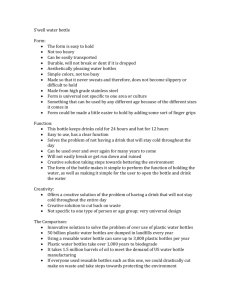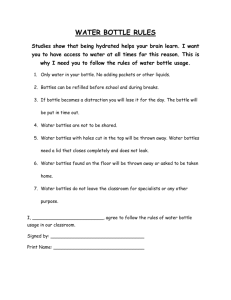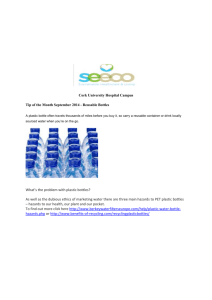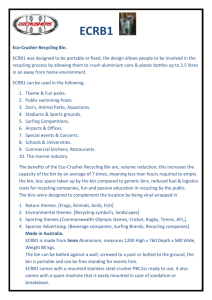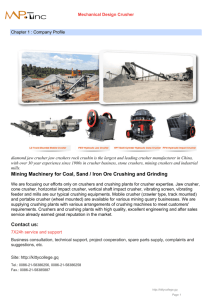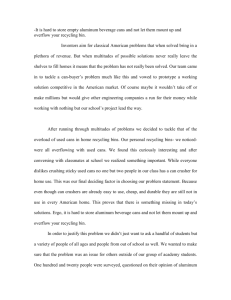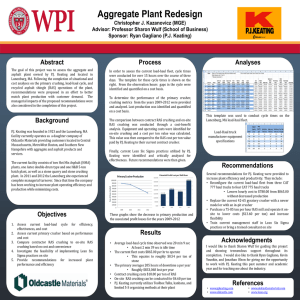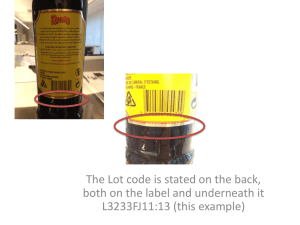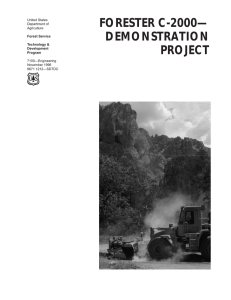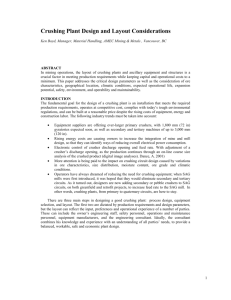New Design Of A Plastic Bottle Crusher
advertisement
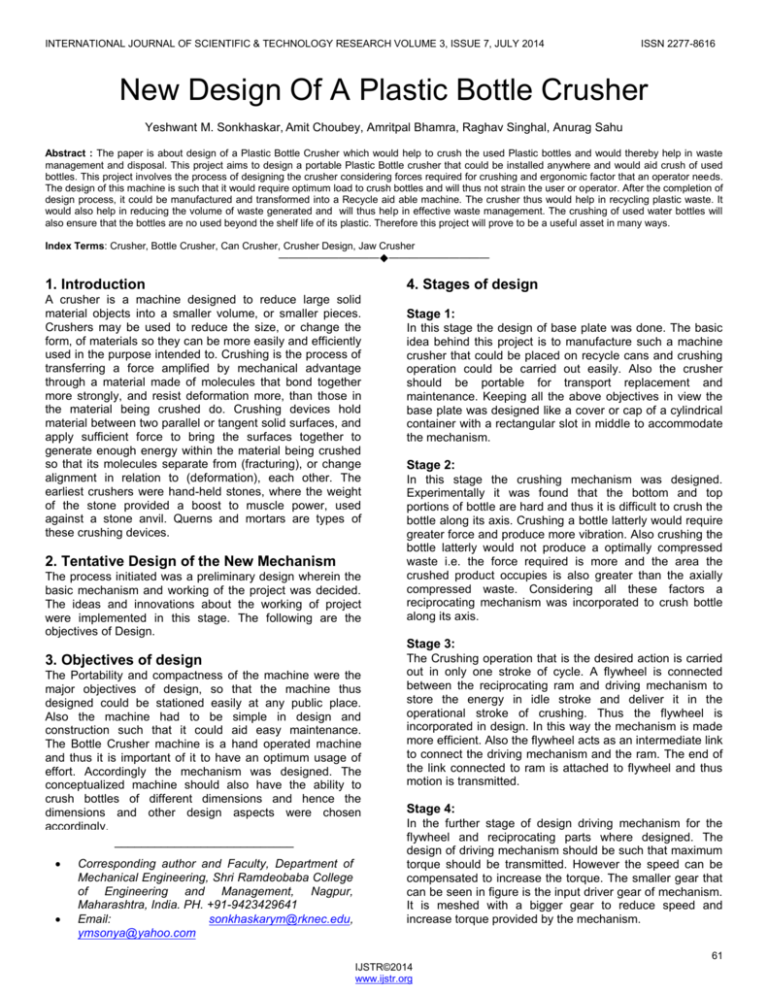
INTERNATIONAL JOURNAL OF SCIENTIFIC & TECHNOLOGY RESEARCH VOLUME 3, ISSUE 7, JULY 2014 ISSN 2277-8616 New Design Of A Plastic Bottle Crusher Yeshwant M. Sonkhaskar, Amit Choubey, Amritpal Bhamra, Raghav Singhal, Anurag Sahu Abstract : The paper is about design of a Plastic Bottle Crusher which would help to crush the used Plastic bottles and would thereby help in waste management and disposal. This project aims to design a portable Plastic Bottle crusher that could be installed anywhere and would aid crush of used bottles. This project involves the process of designing the crusher considering forces required for crushing and ergonomic factor that an operator needs. The design of this machine is such that it would require optimum load to crush bottles and will thus not strain the user or operator. After the completion of design process, it could be manufactured and transformed into a Recycle aid able machine. The crusher thus would help in recycling plastic waste. It would also help in reducing the volume of waste generated and will thus help in effective waste management. The crushing of used water bottles will also ensure that the bottles are no used beyond the shelf life of its plastic. Therefore this project will prove to be a useful asset in many ways. Index Terms: Crusher, Bottle Crusher, Can Crusher, Crusher Design, Jaw Crusher ———————————————————— 1. Introduction 4. Stages of design A crusher is a machine designed to reduce large solid material objects into a smaller volume, or smaller pieces. Crushers may be used to reduce the size, or change the form, of materials so they can be more easily and efficiently used in the purpose intended to. Crushing is the process of transferring a force amplified by mechanical advantage through a material made of molecules that bond together more strongly, and resist deformation more, than those in the material being crushed do. Crushing devices hold material between two parallel or tangent solid surfaces, and apply sufficient force to bring the surfaces together to generate enough energy within the material being crushed so that its molecules separate from (fracturing), or change alignment in relation to (deformation), each other. The earliest crushers were hand-held stones, where the weight of the stone provided a boost to muscle power, used against a stone anvil. Querns and mortars are types of these crushing devices. 2. Tentative Design of the New Mechanism The process initiated was a preliminary design wherein the basic mechanism and working of the project was decided. The ideas and innovations about the working of project were implemented in this stage. The following are the objectives of Design. 3. Objectives of design The Portability and compactness of the machine were the major objectives of design, so that the machine thus designed could be stationed easily at any public place. Also the machine had to be simple in design and construction such that it could aid easy maintenance. The Bottle Crusher machine is a hand operated machine and thus it is important of it to have an optimum usage of effort. Accordingly the mechanism was designed. The conceptualized machine should also have the ability to crush bottles of different dimensions and hence the dimensions and other design aspects were chosen accordingly. ___________________________ Corresponding author and Faculty, Department of Mechanical Engineering, Shri Ramdeobaba College of Engineering and Management, Nagpur, Maharashtra, India. PH. +91-9423429641 Email: sonkhaskarym@rknec.edu, ymsonya@yahoo.com Stage 1: In this stage the design of base plate was done. The basic idea behind this project is to manufacture such a machine crusher that could be placed on recycle cans and crushing operation could be carried out easily. Also the crusher should be portable for transport replacement and maintenance. Keeping all the above objectives in view the base plate was designed like a cover or cap of a cylindrical container with a rectangular slot in middle to accommodate the mechanism. Stage 2: In this stage the crushing mechanism was designed. Experimentally it was found that the bottom and top portions of bottle are hard and thus it is difficult to crush the bottle along its axis. Crushing a bottle latterly would require greater force and produce more vibration. Also crushing the bottle latterly would not produce a optimally compressed waste i.e. the force required is more and the area the crushed product occupies is also greater than the axially compressed waste. Considering all these factors a reciprocating mechanism was incorporated to crush bottle along its axis. Stage 3: The Crushing operation that is the desired action is carried out in only one stroke of cycle. A flywheel is connected between the reciprocating ram and driving mechanism to store the energy in idle stroke and deliver it in the operational stroke of crushing. Thus the flywheel is incorporated in design. In this way the mechanism is made more efficient. Also the flywheel acts as an intermediate link to connect the driving mechanism and the ram. The end of the link connected to ram is attached to flywheel and thus motion is transmitted. Stage 4: In the further stage of design driving mechanism for the flywheel and reciprocating parts where designed. The design of driving mechanism should be such that maximum torque should be transmitted. However the speed can be compensated to increase the torque. The smaller gear that can be seen in figure is the input driver gear of mechanism. It is meshed with a bigger gear to reduce speed and increase torque provided by the mechanism. 61 IJSTR©2014 www.ijstr.org INTERNATIONAL JOURNAL OF SCIENTIFIC & TECHNOLOGY RESEARCH VOLUME 3, ISSUE 7, JULY 2014 Stage 5: Further modification in design was done in this stage. The previous design had only one flywheel driving the crushing ram. This would cause a non-uniform application of force on the bottle which would lead to improper crushing. Therefore two flywheels where incorporated to aid uniform action of force and also balance the weight of complete system. ISSN 2277-8616 Final Design of mechanism: Stage 6: In this stage the driving mechanism of the system was designed. The driving mechanism is placed between the two flywheels to make the system compact. A bevel gear is used to provide drive to the system. Subsequently the bevel gear transmits the power to a set of reduction gear assembly. Fig. Final Design 5. CONCLUSION The study on operation and mechanism of various types of crushers was done in the process and subsequently a crusher mechanism was designed to crush plastic Bottles. The mechanism designed can be used as a portable crusher and can be installed on waste bins. The design of exit port is such that it gives mechanism the agility to crush bottles as well as Cans of various dimensions. The mechanism designed is simple and utilizes optimum effort to crush bottles and cans and thud reduces volume of waste and aids recycling. The fabrication and analysis of this mechanism is in process Fig. Preliminary Design of Mechanism ACKNOWLEDGMENT The larger gear shown with yellow in figure and flywheel are mounted on a common shaft and thus the mechanism is driven Stage 7: In the previous design, as shown in figure, the base was circular in cross section which led to larger utilization of ground space and increased material usage and ultimately led to higher material cost. Hence, rectangular base has been selected as it reduces the ground space required as well the cost of material. We would like to take this opportunity to express our sincere gratitude to Dr. K. N. Agrawal, Head, Department of Mechanical Engineering and Dr. V. S. Deshpande, Principal, RCOEM. The guidance and support received from all the faculty members of Mechanical Engineering Department and Workshop of RCOEM was very vital for the successful completion of the project References Stage 8: During the crushing stroke, the volume of the bottle decreases, which in turn, increases the pressure of the air inside the bottle and obstructs the crushing stroke. To avoid this puncturing operating is performed. Cutter is used to the cut the bottle during the crushing stroke which will aid in removal of air present inside the bottle. Stage 9: In the previous design, shown in figure 3.6, the guide bar was circular as shown in the figure. The bottle was quite unstable in the circular bar system during the crushing stroke as no proper support was being provided to the bottle. Hence, the selection of rectangular bar eliminated all the flaws of circular bar thus giving proper support and aiding the crushing mechanism. [1]. Warren R. Heiser, 934 N. Mildred, Dearborn, Mich. 48128, “Can Crusher” Appl. No.: 450,422, Mar. 12, 1974. Patent [2]. Larry M. Belfils, 12670 San Pablo Ave., Richmond, Calif. 94803, “Can Crusher” Appl. No.: 810,526, Jun. 27, 1977. Patent [3]. Constantino J. Balbo, 116 France St.; Leonard F. Bruhn; Clements E. Bruhn, both of P.O. Box 153, all of Sonoma, Calif. 95476, “Can Crusher” Appl. No.: 198,522, Oct. 20, 1980. Patent [4]. George F. Wittmeier “Can Crusher for reducing cans or similar containers to a compact form” Appl. No.: 679,577, Apr. 23, 1976. Patent [5]. La-la ZHAQ, Zhong-binWANG and Feng ZANG, “ Multi62 IJSTR©2014 www.ijstr.org INTERNATIONAL JOURNAL OF SCIENTIFIC & TECHNOLOGY RESEARCH VOLUME 3, ISSUE 7, JULY 2014 ISSN 2277-8616 object optimization design for differential and grading toothed roll crusher using a genetic algorithm”, “Journal of China University of mining and technology”, Volume 18, Issue 2, June, Page 316-320, 2008. [6]. Gupta and D. S. Yan, “Gyratory and Cone Crusher”, ”Mineral Processing Design and Operation”, Volume 2, Pages 128-141, 2006. [7]. M. Moshgbar, R. A. Bearmant, R. Parkin, “Optimum control of cone crusher utilising an adaptive strategy for wear compensation”, “ Journal of Minerals Engineering”, Volume 8,Issues 4-5, April, Pages 367-376, 1995. [8]. Joseph Edward Shigley, Shigley’s Mechanical Engineering Design, Mc. Graw Hill Publishers, 8th Edition, Pg. Nos.: 33- 145, 209- 260. 63 IJSTR©2014 www.ijstr.org
